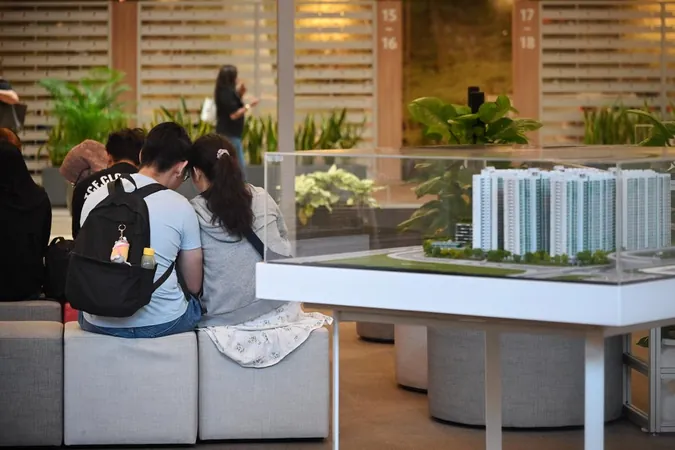
Major Changes Ahead: HDB's New Income Assessment Rules Empower Young Couples to Secure Their Dream BTO Flats!
2025-03-28
Author: Nur
SINGAPORE -
In a groundbreaking move, the Housing Development Board (HDB) has announced significant changes to the income assessment process for young couples looking to purchase Build-To-Order (BTO) flats. This initiative aims to ease the journey for those still in school or just starting their careers, giving them a greater chance to own their ideal homes.
Beginning with the next BTO exercise scheduled for July, young couples can now defer their income assessment for housing loans until they are close to collecting the keys to their flats, provided at least one partner is a full-time student or serving in national service. This shift means that couples will be able to base their loan eligibility on combined incomes after gaining some work experience, potentially qualifying for more substantial loans.
National Development Minister Desmond Lee revealed this exciting news during an engagement session held at the National University of Singapore on March 26. He emphasized the government's commitment to increasing the supply of BTO flats, aiming for shorter waiting times of under three years. Over 12,000 new flats will be launched between 2025 and 2027, part of a broader rollout of more than 50,000 flats expected during this period—a considerable increase compared to the past five years.
Minister Lee underscored that this relaxed income assessment will help young couples settle down sooner, particularly if they intend to start families and require larger living spaces. Previously, two partners needing to qualify for deferred assessment were limited to specific criteria, such as both being full-time students or national servicemen, or having recently completed their education or service. Now, if one partner is a student and the other has begun working, the couple can apply for their desired flat, allowing them to access larger housing units like four- or five-room flats.
For example, a couple with a combined income of $3,500 per month might have only qualified for a three-room flat in Yishun—an option that could feel cramped for growing families. Under the new scheme, after about three years, as both partners enter the workforce and potentially increase their combined income to around $7,500, they can then qualify for a more spacious four- or five-room flat.
This update comes in response to broader concerns about housing availability and accessibility for young couples. Minister Lee reaffirmed the government's plans to surpass their initial goal of launching 100,000 new flats from 2021 to 2025. In doing so, the median waiting time for BTO flats has been reduced to under four years, reviving stability in the housing market post-pandemic.
Additionally, the minister addressed the ongoing debate regarding the minimum age for singles wishing to purchase BTO or resale flats, currently set at 35 years. While the authorities are reviewing this restriction, there has been progress as singles can now apply for two-room flexi flats in all locations since October 2024, with priority access for those purchasing near their parents slated for mid-2025.
Addressing worries about skyrocketing property prices, Minister Lee reassured students that a diverse range of affordable housing options exists to cater to various budgets. The newly introduced flat classification system categorizes BTO projects into Standard, Plus, and Prime tiers, based on their proximity to the city and amenities, aiming to mitigate the "lottery effect" for prime locations.
Fourth-year business student Stefanie Gan expressed optimism about the new rules, indicating that she and her boyfriend, who began working full-time, are now contemplating applying for a four-room flat in the Prime or Plus category—something that previously seemed out of reach due to their budget constraints.
With these proactive measures, the HDB is not only making strides towards a more inclusive housing market but also providing young couples with new hope for their future homes. The timing couldn't be better as Singapore's housing market continues to evolve and adapt to the needs of its residents.
 Brasil (PT)
Brasil (PT)
 Canada (EN)
Canada (EN)
 Chile (ES)
Chile (ES)
 Česko (CS)
Česko (CS)
 대한민국 (KO)
대한민국 (KO)
 España (ES)
España (ES)
 France (FR)
France (FR)
 Hong Kong (EN)
Hong Kong (EN)
 Italia (IT)
Italia (IT)
 日本 (JA)
日本 (JA)
 Magyarország (HU)
Magyarország (HU)
 Norge (NO)
Norge (NO)
 Polska (PL)
Polska (PL)
 Schweiz (DE)
Schweiz (DE)
 Singapore (EN)
Singapore (EN)
 Sverige (SV)
Sverige (SV)
 Suomi (FI)
Suomi (FI)
 Türkiye (TR)
Türkiye (TR)
 الإمارات العربية المتحدة (AR)
الإمارات العربية المتحدة (AR)